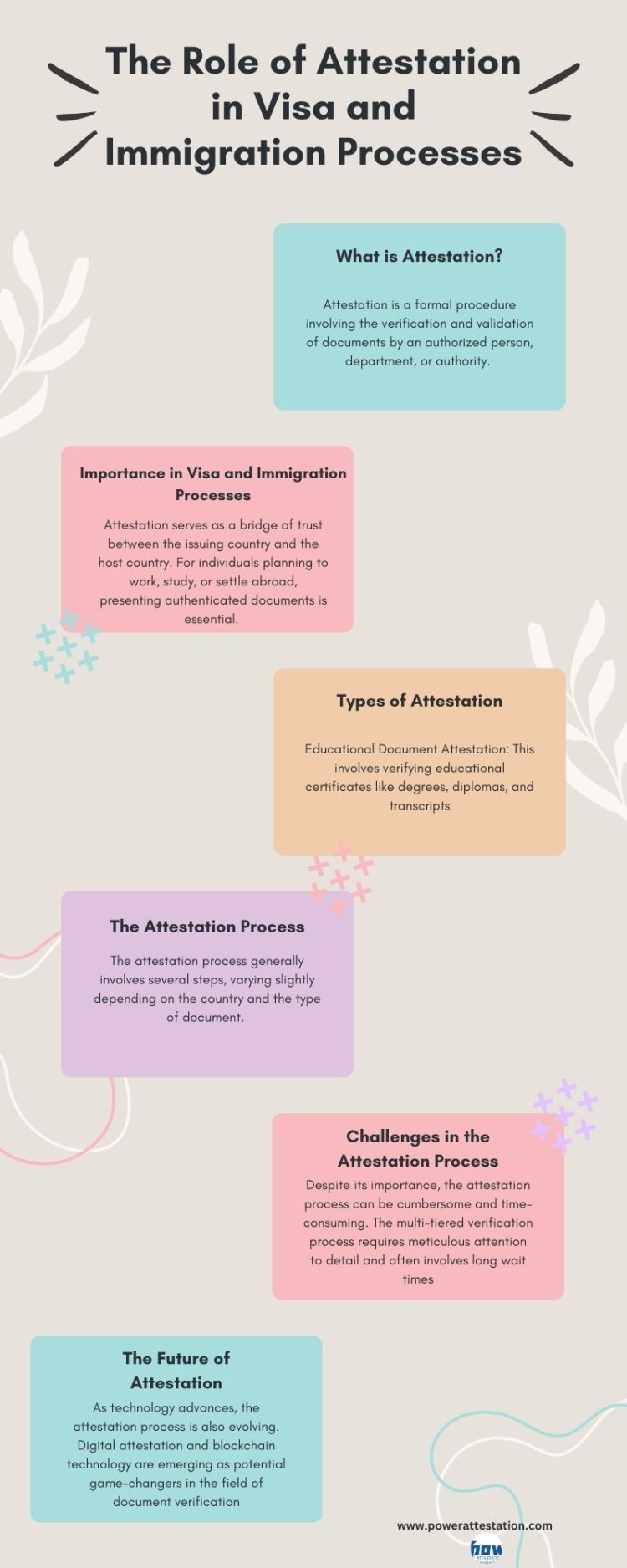The Role of Attestation in Visa and Immigration Processes
Share this Post to earn Money ( Upto ₹100 per 1000 Views )

In today’s globalized world, the movement of people across borders for work, study, and residency has become increasingly common. However, navigating the intricate web of visa and immigration processes can be challenging. One critical component of these processes is document attestation. Attestation is the procedure of verifying the authenticity of documents, ensuring they are genuine and recognized by foreign authorities. This verification is crucial for legal, educational, and professional purposes in the host country. Understanding the role of attestation in visa and immigration processes can significantly smooth the journey of moving abroad.

What is Attestation?

Attestation is a formal procedure involving the verification and validation of documents by an authorized person, department, or authority. This process typically involves multiple levels of authentication, beginning with local authorities and progressing to higher governmental bodies and, in some cases, international entities. The primary goal of attestation is to confirm that the document is legitimate and issued by a recognized institution. Common documents requiring attestation include educational certificates, birth and marriage certificates, commercial documents, and power of attorney.
Importance in Visa and Immigration Processes

Attestation serves as a bridge of trust between the issuing country and the host country. For individuals planning to work, study, or settle abroad, presenting authenticated documents is essential. For instance, educational certificates need to be attested to confirm the qualifications and skills of the applicant. This verification helps educational institutions and employers in the host country to trust the authenticity of the credentials.
Types of Attestation
Educational Document Attestation: This involves verifying educational certificates like degrees, diplomas, and transcripts. Educational document attestation is crucial for students applying for higher education abroad and professionals seeking employment in foreign countries.
Personal Document Attestation: This category includes documents such as birth certificates, marriage certificates, and affidavits. Personal document attestation is often required for visa applications, residency permits, and family-related immigration processes.
Commercial Document Attestation: Businesses expanding operations overseas or engaging in international trade often need to attest commercial documents such as company registration certificates, invoices, and agreements. This type of attestation facilitates smooth business operations in foreign jurisdictions.
The Attestation Process
The attestation process generally involves several steps, varying slightly depending on the country and the type of document. The typical steps are as follows:
Notary Attestation: The first step is getting the document attested by a notary public. This step ensures that the document is genuine and has been verified by a legal authority at the local level.
Home Department or Education Department Attestation: For educational and personal documents, the next step is verification by the respective state or regional department. Educational certificates are authenticated by the Education Department, while personal documents go through the Home Department.
Ministry of External Affairs (MEA) Attestation: The document is then sent to the Ministry of External Affairs for further verification. The MEA attestation is a crucial step, as it confirms the document’s authenticity at the national level.
Embassy or Consulate Attestation: The final step involves attestation by the embassy or consulate of the host country. This step ensures that the document is recognized by the foreign country’s authorities.
Challenges in the Attestation Process
Despite its importance, the attestation process can be cumbersome and time-consuming. The multi-tiered verification process requires meticulous attention to detail and often involves long wait times. Additionally, the requirements and procedures can vary widely between countries, adding to the complexity. Misunderstandings or errors in the documentation can lead to delays, impacting visa and immigration timelines.
Role of Professional Attestation Services
To navigate the complexities of the attestation process, many individuals and businesses turn to professional attestation services. These services specialize in managing the entire attestation process, ensuring accuracy and compliance with the specific requirements of each country. Professional attestation services handle document submission, follow-ups, and secure delivery, significantly reducing the burden on applicants. Utilizing these services can expedite the attestation process, providing peace of mind and allowing applicants to focus on other aspects of their move abroad.
Attestation and Immigration Policies

The role of attestation in visa and immigration processes is also influenced by the immigration policies of the host country. Countries with stringent immigration policies often have rigorous attestation requirements to ensure the authenticity of documents. For example, countries in the Middle East, such as the United Arab Emirates (UAE), have strict attestation procedures to verify the qualifications and personal status of expatriates. On the other hand, countries with more lenient immigration policies may have simplified attestation processes.
The Future of Attestation

As technology advances, the attestation process is also evolving. Digital attestation and blockchain technology are emerging as potential game-changers in the field of document verification. These technologies can enhance the efficiency, security, and transparency of the attestation process. Digital attestation allows for the electronic verification of documents, reducing the need for physical handling and speeding up the process. Blockchain technology, with its decentralized and immutable nature, offers a robust solution for preventing fraud and ensuring the authenticity of documents.
Conclusion
In conclusion, attestation plays a pivotal role in visa and immigration processes, serving as a key mechanism for verifying the authenticity of documents. This process builds trust between the issuing and host countries, facilitating the movement of individuals and businesses across borders. While the attestation process can be complex and time-consuming, professional attestation services and emerging technologies are helping to streamline and simplify it. As the world continues to become more interconnected, the importance of efficient and reliable attestation processes will only grow, ensuring that the global movement of people and businesses remains smooth and secure.















